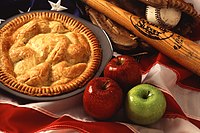
Photo from wikipedia
The effect of baking temperature on the physicochemical, sensory and digestive properties of eel burgers was investigated. The moisture content of eel burgers gradually decreased with increased baking temperature, whereas… Click to show full abstract
The effect of baking temperature on the physicochemical, sensory and digestive properties of eel burgers was investigated. The moisture content of eel burgers gradually decreased with increased baking temperature, whereas the water-holding capacity remained unchanged. The breaking force of eel burgers baked at 160°C was significantly higher than that at other baking temperatures. With increased baking temperature from 100 to 220°C, amide I in the Fourier transform infrared spectroscopy of eel burgers shifted from 1,645 to 1,633 cm−1, and the peak intensity of 1,744 cm−1 initially increased and then decreased. When the baking temperature exceeded 160°C, the band intensity of protein aggregate increased gradually with increased baking temperature. Scanning electron microscopy result indicated that the muscle fibers in eel burgers contracted significantly with increased baking temperature, and a honeycomb-like network structure appeared in eel burgers baked at 220°C. The sulfur compounds in the eel burgers baked at 130°C were lower than those of the sample baked at 100°C, but it increased gradually with further increased baking temperature. The aftertaste astringency, richness, saltiness, and overall acceptability of eel burgers increased with increased baking temperature. The eel burgers baked at 130–160°C could be easily digested according to the in vitro digestibility and confocal laser confocal microscopy of gastrointestinal digests. In conclusion, the texture properties, barbecue aroma, and digestibility of eel burgers could be controlled by the baking temperature.
Journal Title: Frontiers in Nutrition
Year Published: 2022
Link to full text (if available)
Share on Social Media: Sign Up to like & get
recommendations!